Table of Contents
If you’re a new Poodle puppy owner, congratulations! Poodles are highly intelligent and trainable dogs, making them a great choice for first-time dog owners. However, training a Poodle puppy can be challenging, especially if you’re not familiar with the breed’s unique characteristics. In this article, we’ll provide you with a comprehensive guide on how to train a Poodle puppy, from basic obedience to more advanced training techniques.
Before we dive into the training process, it’s essential to understand Poodle puppies’ characteristics. Poodles are highly intelligent dogs that require mental stimulation and socialization to thrive. They’re also known for their high energy levels, which means they need plenty of exercise and playtime. By understanding your Poodle puppy’s unique needs, you can tailor your training approach to ensure they’re happy and healthy.
How to Train A Poodle Puppy?
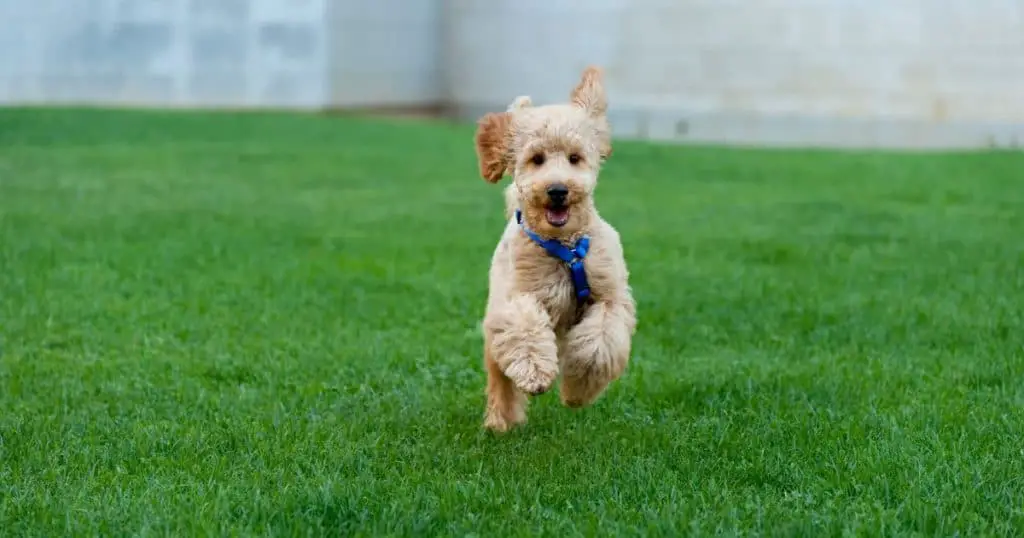
- Poodle puppies are highly intelligent and require mental stimulation and socialization to thrive.
- Poodle puppies have high energy levels and require plenty of exercise and playtime.
- Understanding your Poodle puppy’s unique needs is essential to tailor your training approach.
Understanding Poodle Puppies
If you’re considering getting a Poodle puppy, you’re in for a treat. Poodles are a highly intelligent breed known for their ability to learn quickly. They come in three sizes: Standard, Miniature, and Toy, and each size has its own unique set of characteristics.
Poodle puppies are born with their eyes and ears closed, and they rely on their sense of smell to navigate the world around them. They begin to open their eyes and ears at around two weeks old, and this is when they start to become more aware of their surroundings.
As Poodle puppies grow, they go through various developmental stages, and it’s important to understand these stages to ensure that you’re providing them with the right care and training. For example, socialization is crucial during the first few months of a Poodle puppy’s life, as this is when they learn how to interact with other dogs and people.
Poodle puppies are known for their high intelligence, which can make them easy to train. However, they can also be stubborn at times, so it’s important to be patient and consistent when training them. Positive reinforcement is key, and it’s important to reward good behavior with treats, praise, and playtime.
When it comes to training Poodle puppies, it’s important to start early. Enrolling your Poodle puppy in a puppy kindergarten class when they’re around 8 to 12 weeks old can be a great way to socialize them and teach them basic obedience commands. Training classes can also help address any behavioral issues, such as jumping up or barking excessively.
In conclusion, understanding Poodle puppies is key to providing them with the right care and training. With their high intelligence and eagerness to learn, Poodle puppies can make great companions with the right training and socialization.
Preparing for Your Poodle Puppy
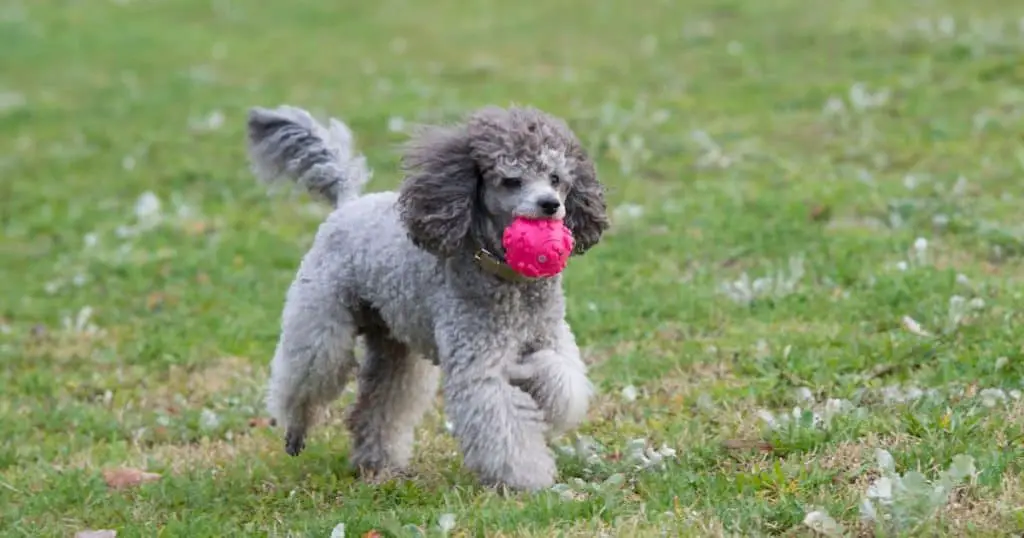
Congratulations on your decision to bring home a Poodle puppy!
Before you bring your furry friend home, there are a few things you need to do to prepare. In this section, we’ll go over some important steps you should take to ensure your Poodle puppy has a smooth transition into your home.
Dog Owner
First things first, make sure you are prepared to be a dog owner. Owning a dog is a big responsibility and requires a lot of time, patience, and money. Make sure you have the time and resources to properly care for your Poodle puppy. This includes providing regular exercise, proper nutrition, and veterinary care.
Yard
Poodles are active dogs that require regular exercise. A fenced yard is a great place for your Poodle puppy to run and play. Before bringing your puppy home, make sure your yard is secure and free from any hazards. Check for holes in the fence, poisonous plants, and any other potential dangers.
Toys
Poodles are intelligent dogs that require mental stimulation. Providing your Poodle puppy with toys is a great way to keep them entertained and mentally stimulated. Make sure to choose toys that are safe and appropriate for your puppy’s age and size.
Pets
If you already have pets in your home, it’s important to introduce them to your new Poodle puppy slowly and carefully. Make sure to supervise all interactions between your pets until they have had a chance to get to know each other.
Name
Choosing a name for your Poodle puppy is an important decision. Make sure to choose a name that is easy to pronounce and that your puppy will respond to. Consider choosing a name that reflects your puppy’s personality or physical characteristics.
Routine
Establishing a routine for your Poodle puppy is important for their overall health and well-being. Make sure to establish a feeding schedule, exercise routine, and bedtime routine. Consistency is key when it comes to establishing a routine for your Poodle puppy.
Puppy Food
Choosing the right food for your Poodle puppy is important for their overall health and well-being. Make sure to choose a high-quality puppy food that is appropriate for your puppy’s age and size. Consult with your veterinarian for recommendations on the best food for your Poodle puppy.
Vaccines
Vaccines are an important part of keeping your Poodle puppy healthy. Make sure to schedule an appointment with your veterinarian to get your puppy vaccinated. Your veterinarian will be able to recommend a vaccine schedule that is appropriate for your puppy’s age and health.
Professional Groomer
Poodles have a unique coat that requires regular grooming. Finding a professional groomer who is experienced in grooming Poodles is important. Make sure to research local groomers and read reviews before choosing one for your Poodle puppy.
By following these steps, you can ensure your Poodle puppy has a smooth transition into your home. With proper preparation and care, your Poodle puppy will become a beloved member of your family in no time!
Basic Poodle Puppy Training
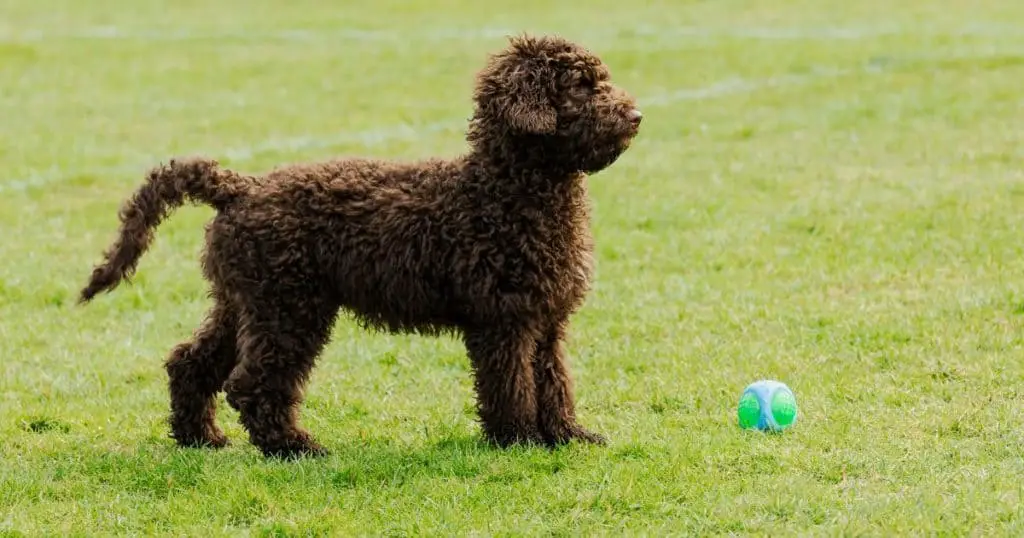
Congratulations on getting a new Poodle puppy! Now it’s time to start training your furry friend. In this section, we’ll cover the basics of Poodle puppy training, including how to use positive reinforcement, verbal and hand signals, and obedience commands.
Training your Poodle puppy should start as early as possible. Daily training sessions are recommended to ensure that your puppy learns quickly and consistently. Poodle puppies are intelligent and eager to please, so training them is usually a fun and rewarding experience.
When it comes to training, positive reinforcement is key. This means rewarding your puppy for good behavior with treats, praise, or playtime. Punishing bad behavior is not recommended, as it can be confusing and counterproductive.
Verbal commands are an important part of Poodle puppy training. Some basic commands to teach your puppy include “sit,” “stay,” and “lie down.” Use a clear, firm tone of voice and be consistent in your commands. Hand signals can also be used in conjunction with verbal commands to reinforce the desired behavior.
Obedience training is another important aspect of Poodle puppy training. This involves teaching your puppy to follow basic commands and behave appropriately in different situations. A consistent schedule and daily training sessions can help your puppy learn quickly and effectively.
In addition to basic obedience training, Poodle puppies can also be taught tricks. This can be a fun way to bond with your puppy and keep them mentally stimulated. Some popular tricks to teach your Poodle puppy include “roll over,” “play dead,” and “shake.”
Overall, Poodle puppy training requires patience, consistency, and positive reinforcement. With the right approach, you can train your puppy to be a well-behaved and obedient companion.
Poodle Puppy Potty Training

Potty training your Poodle puppy is an essential part of housebreaking and teaching them good habits. It can be a frustrating process, but with patience and consistency, your puppy will learn to eliminate outside and avoid accidents indoors.
Establishing a bathroom schedule is critical to the success of potty training. Take your puppy outside to a grassy area every 1-2 hours, especially after eating, drinking, or playing. Praise and reward your puppy for eliminating outside to reinforce good behavior.
If you don’t have access to a grassy area, create a designated area in your backyard or use pee pads indoors. However, it’s essential to transition your puppy to eliminating outside as soon as possible to avoid confusion and accidents.
Accidents are bound to happen during the potty training process. When your puppy has an accident indoors, clean it up immediately with an enzymatic cleaner to eliminate the scent and discourage repeat accidents in the same spot.
Consistency is key when potty training your Poodle puppy. Stick to a routine and be patient. With time and effort, your puppy will learn to eliminate outside and become a well-behaved member of your household.
Crate and Leash Training
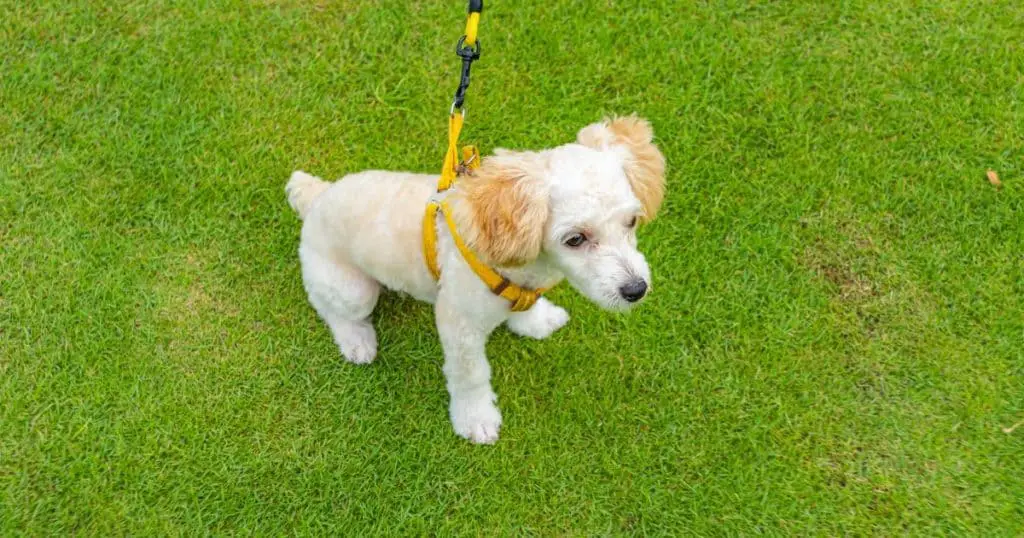
Crate training and leash training are essential for your Poodle puppy’s safety and well-being. It is also a great way to teach your pup boundaries and keep them from danger.
Crate training is a great way to keep your Poodle puppy safe and secure when you are not around. It also helps with potty training and prevents destructive behavior. When crate training your Poodle puppy, ensure that you choose the right crate size for them. The crate should be big enough for your puppy to stand up, turn around, and lie down comfortably. If the crate is too big, your puppy might use one end as a bathroom and the other end as a sleeping area.
When introducing your Poodle puppy to the crate, make it a positive experience. Put a soft blanket or bed inside the crate and leave the door open. Let your pup explore the crate at their leisure. You can also toss in some treats or toys to make the crate more inviting. Gradually increase the time your puppy spends inside the crate, and always reward them for good behavior.
Leash training is also essential for your Poodle puppy’s safety. It helps you control your pup and prevents them from running off or getting into dangerous situations. When leash training your Poodle puppy, ensure that you choose the right leash and collar size for them. The collar should be snug but not too tight, and the leash should be long enough to allow your puppy to move around comfortably.
When introducing your Poodle puppy to the leash, make it a positive experience. Let your pup sniff the leash and collar before putting it on them. Start by walking around your home or backyard, and gradually increase the distance and duration of your walks. Always reward your puppy for good behavior, and never pull or yank on the leash.
In conclusion, crate training and leash training are essential for your Poodle puppy’s safety and well-being. It helps teach your pup boundaries and prevents them from getting into dangerous situations. Always make the training experience positive, and reward your puppy for good behavior. With patience and consistency, your Poodle puppy will become a well-behaved and happy member of your family.
Socialization and Mental Stimulation
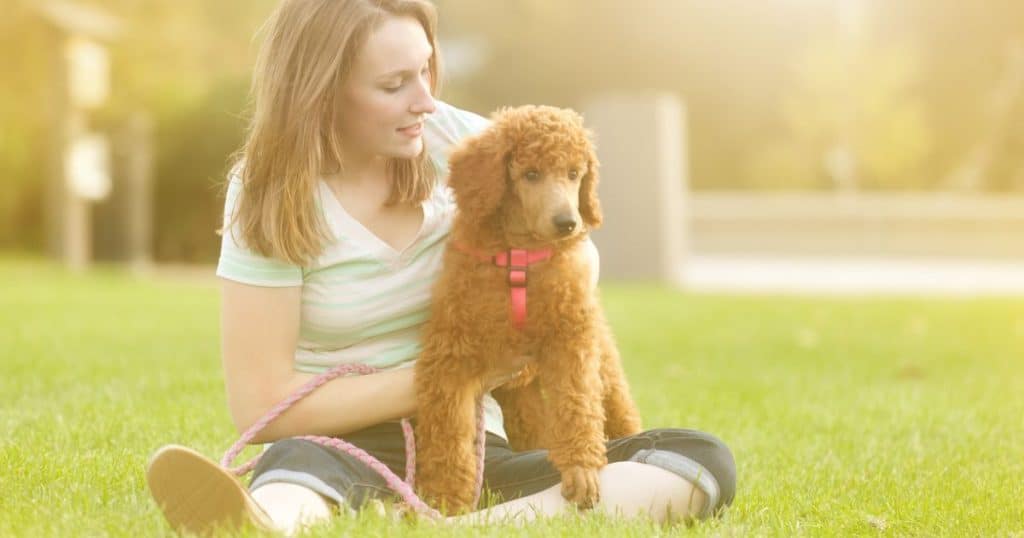
Socialization and mental stimulation are crucial for the development of your Poodle puppy. Poodles are eager to please and highly intelligent, which means they need plenty of opportunities to learn and explore. If they don’t receive enough mental stimulation, they can become bored and destructive.
It’s important to socialize your Poodle puppy from a young age. Expose them to different people, animals, places, sights, and sounds. This will help them develop into a well-adjusted and confident adult dog. Well-run puppy classes are a great way to socialize your puppy. They provide a safe and controlled environment for your puppy to interact with other dogs and people.
In addition to socialization, mental stimulation is also essential for your Poodle puppy’s development. Poodles are working dogs, which means they need plenty of mental exercise to stay happy and healthy. Without enough mental stimulation, they can become anxious and destructive.
There are many ways to provide mental stimulation for your Poodle puppy. One way is to teach them new tricks and commands. Poodles are highly trainable and love to learn. You can teach them basic commands like sit, stay, and come, as well as more advanced tricks like spin, roll over, and shake hands.
Another way to provide mental stimulation is through puzzle toys. Puzzle toys are toys that require your puppy to solve a problem to get a reward. For example, you can hide treats inside a puzzle toy and your puppy will have to figure out how to get the treats out. This provides mental exercise and keeps your puppy entertained.
In conclusion, socialization and mental stimulation are crucial for the development of your Poodle puppy. Make sure to expose them to different people, animals, places, sights, and sounds, and provide plenty of mental exercise through training and puzzle toys. With the right care and attention, your Poodle puppy will grow into a happy and well-adjusted adult dog.
Dealing with Potential Issues
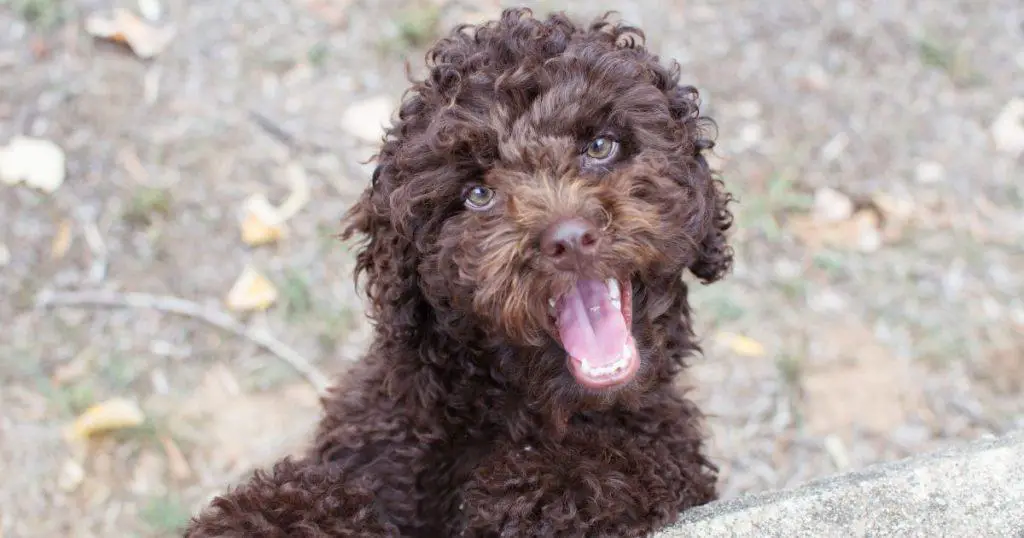
When training your Poodle puppy, there may be some potential issues that you need to be prepared for. Patience and consistency are key when dealing with these issues. It’s important to remember that puppies are still learning and may not understand what is expected of them right away.
One of the most common issues when training a puppy is biting. Puppies explore the world with their mouths and may nip or bite during playtime. It’s important to redirect their attention to a toy or chew instead of your hands or clothing. If your puppy continues to bite, you can try yelping or saying “ouch” to let them know that it hurts and is not acceptable behavior.
Another issue that may arise is destructive behavior. Puppies may chew on furniture or shoes, especially during the teething phase. Providing appropriate chew toys and keeping valuable items out of reach can help prevent this behavior. If your puppy does chew on something they shouldn’t, redirect their attention to a toy and praise them when they chew on it instead.
Jumping is another common issue that can be addressed through training. When your puppy jumps up, turn away and ignore them until they have all four paws on the ground. Then, reward them with attention and praise. Consistency is key with this behavior, as even one instance of allowing jumping can reinforce the behavior.
Housetraining can also be a challenge, but with consistency and patience, your puppy will learn. Take your puppy outside frequently, especially after meals and naps. Praise and reward them when they go potty outside. If accidents happen inside, clean them up with an enzymatic cleaner to remove the scent and prevent your puppy from going to the same spot again.
It’s important to note that punishment is not an effective training method. Instead, focus on positive reinforcement and redirecting unwanted behavior. With patience and consistency, your Poodle puppy will learn and grow into a well-behaved adult dog.
Rewarding Your Poodle Puppy
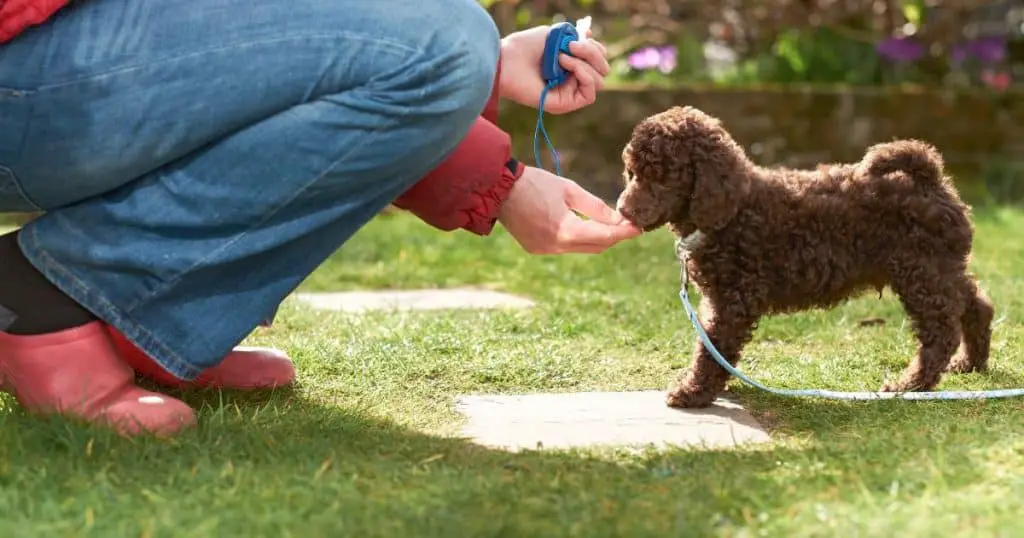
Rewarding your Poodle puppy is an essential part of training. It helps to reinforce good behavior and motivates your puppy to repeat that behavior. There are several ways to reward your Poodle puppy, including praise, food, toys, and treats.
Praise is a simple and effective way to reward your Poodle puppy. It can be as simple as saying “Good boy/girl” or “Well done” in a happy and enthusiastic tone. You can also use physical affection, such as petting or a belly rub, to reward your puppy. However, it’s important to note that some dogs may not respond well to physical affection, so it’s essential to observe your puppy’s behavior and adjust accordingly.
Food is another great way to reward your Poodle puppy. You can use their regular meals as a reward, or you can use special treats. When using food as a reward, it’s important to use small pieces to avoid overfeeding your puppy. You can also use food puzzles or interactive toys to make the reward more engaging and mentally stimulating for your puppy.
Toys are another excellent way to reward your Poodle puppy. Poodles are known for their love of toys, so this can be a great motivator for them. You can use their favorite toy as a reward or introduce new toys as a reward for good behavior. Interactive toys, such as puzzle toys or fetch toys, can also provide mental stimulation and help to reinforce good behavior.
Treats are another popular way to reward your Poodle puppy. Treats can be used as a primary reward or as a supplement to other rewards. It’s important to choose healthy treats and avoid overfeeding your puppy. Treats should be used sparingly, and you should always consider your puppy’s dietary needs and restrictions.
In summary, rewarding your Poodle puppy is an essential part of training. You can use praise, food, toys, and treats to reinforce good behavior and motivate your puppy. It’s important to observe your puppy’s behavior and adjust your rewards accordingly. With consistent and positive reinforcement, your Poodle puppy will learn quickly and become a well-behaved and happy companion.
Advanced Training Tips
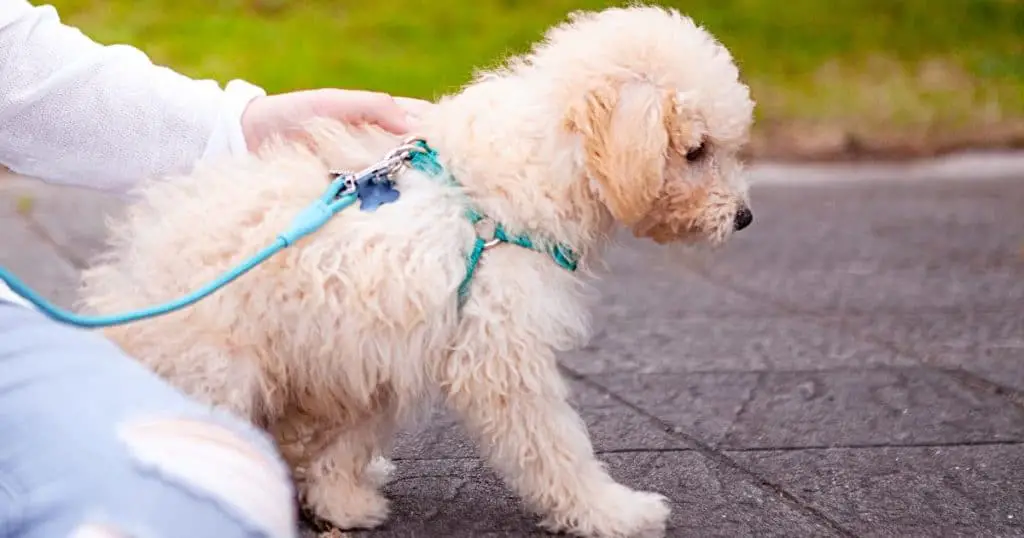
Now that your Poodle puppy has mastered the basics, it’s time to move on to more advanced training techniques. These tips will help you take your pup’s skills to the next level and ensure that they are a well-trained and obedient companion.
Trainable Poodles
Poodles are highly trainable dogs and excel in obedience training. They are intelligent and eager to please, making them the perfect candidate for advanced training. With consistent training and positive reinforcement, your Poodle can learn a wide range of skills and cues.
Tips and Tricks
When it comes to advanced training, it’s important to keep things fun and engaging for your pup. Use positive reinforcement techniques and reward your Poodle with treats and praise when they perform well. Keep training sessions short and frequent, and mix up the exercises to keep your pup engaged.
Skills and Cues
Advanced training can include a wide range of skills and cues, including agility training, tricks, and advanced obedience commands. Some popular skills to teach your Poodle include:
- Agility Training: Teach your Poodle to navigate through obstacles such as tunnels, jumps, and weave poles.
- Tricks: Teach your Poodle fun and impressive tricks such as rolling over, playing dead, and jumping through hoops.
- Advanced Obedience Commands: Teach your Poodle advanced obedience commands such as heel, stay, and come.
Intelligence
Poodles are known for their intelligence and are considered one of the smartest dog breeds. This means that they can learn complex commands and skills quickly and easily. Keep training sessions challenging to keep your Poodle’s mind engaged and stimulated.
Obedience Class
If you’re struggling with advanced training, consider enrolling your Poodle in an obedience class. These classes can provide your pup with the socialization and structure they need to excel in advanced training. Plus, you’ll have the guidance and support of a professional trainer to help you along the way.
In conclusion, advanced training can take your Poodle’s skills to the next level and ensure that they are a well-trained and obedient companion. With consistent training, positive reinforcement, and a little bit of patience, your Poodle can learn a wide range of skills and cues that will impress your friends and family.
Building a Bond with Your Poodle Puppy
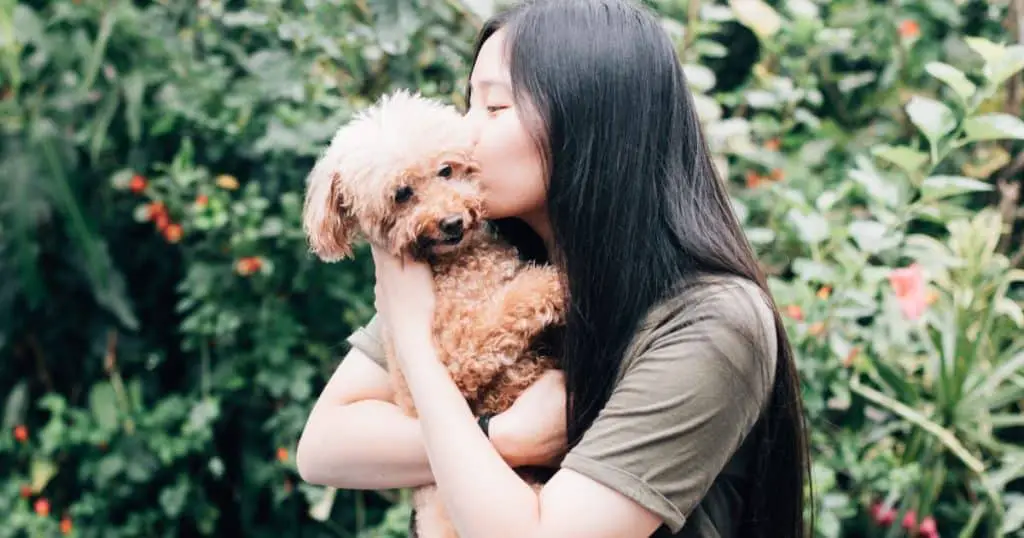
One of the most important things you can do when training your Poodle puppy is to build a strong bond with them. This bond will help your puppy feel more connected to you, which will make training easier and more effective.
To build a bond with your Poodle puppy, you need to give them your undivided attention. Spend quality time with your puppy every day, engaging in activities they love. This could be anything from playing fetch to going for a walk or cuddling on the couch.
During these activities, make sure to give your puppy plenty of positive reinforcement. Use treats, praise, and affection to let them know they are doing a good job. This will help your puppy associate you with positive experiences, which will strengthen your bond.
Another way to build a bond with your Poodle puppy is through training. Poodles are intelligent dogs who usually love training. When you and your puppy train together, you are learning to communicate with each other, which goes a long way in creating a lasting bond. As long as you keep training fun and engaging, it will help your Poodle feel more connected to you.
Remember that building a bond with your Poodle puppy takes time and effort. But the rewards of having a strong bond with your furry friend are well worth it. By spending quality time together, giving positive reinforcement, and training together, you can build a bond that will last a lifetime.
FAQs
What are some fun tricks to teach my Standard Poodle puppy?
Teaching your Standard Poodle puppy tricks can be a fun way to bond with your furry friend. Some fun tricks to teach your Poodle include “shake,” “roll over,” “play dead,” and “spin.” Remember to keep training sessions short and positive, and always reward your pup with treats and praise.
How can I establish a schedule for my Standard Poodle puppy’s training?
Establishing a training schedule for your Standard Poodle puppy is essential for successful training. Start by setting aside specific times each day for training sessions, and be consistent with your schedule. Remember to keep training sessions short and positive, and always reward your pup with treats and praise.
Are Toy Poodles generally easy to train?
Toy Poodles are generally intelligent and trainable dogs. However, like all dogs, they can be stubborn at times. Consistency, patience, and positive reinforcement are key to successfully training your Toy Poodle. Remember to keep training sessions short and positive, and always reward your pup with treats and praise.
What are some effective ways to discipline a Poodle?
Disciplining your Poodle should always be done in a positive and constructive manner. Avoid physical punishment or yelling, as this can be harmful to your pup and damage your relationship. Instead, use positive reinforcement to encourage good behavior, and redirect your pup’s attention when they are misbehaving.
When should I start training my Poodle?
It’s important to start training your Poodle as early as possible, ideally when they are still a puppy. Puppies are more receptive to training and can learn new behaviors quickly. Remember to keep training sessions short and positive, and always reward your pup with treats and praise.
What are some useful commands to teach my Poodle?
Teaching your Poodle basic commands is essential for successful training. Some useful commands to teach your Poodle include “sit,” “stay,” “come,” and “heel.” Remember to keep training sessions short and positive, and always reward your pup with treats and praise.

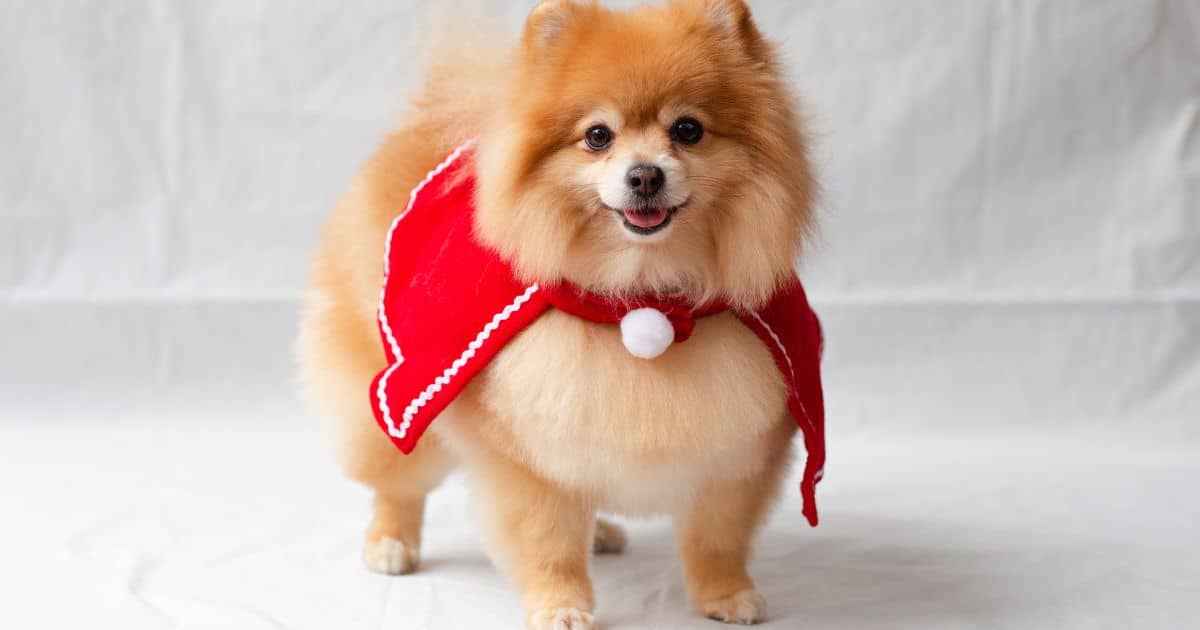
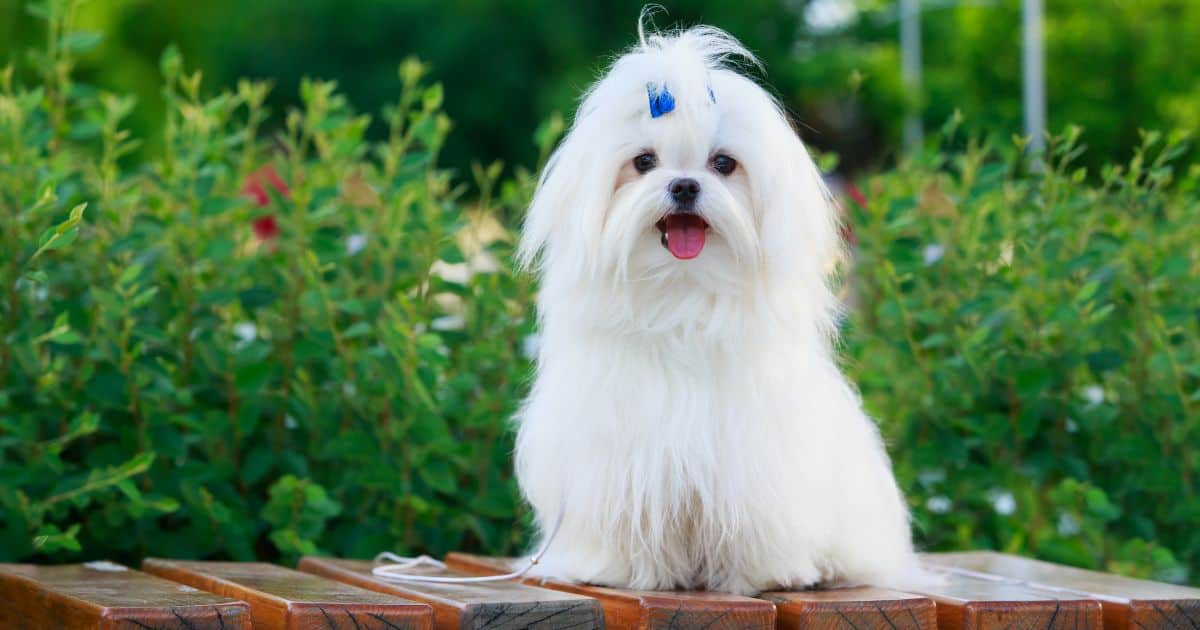
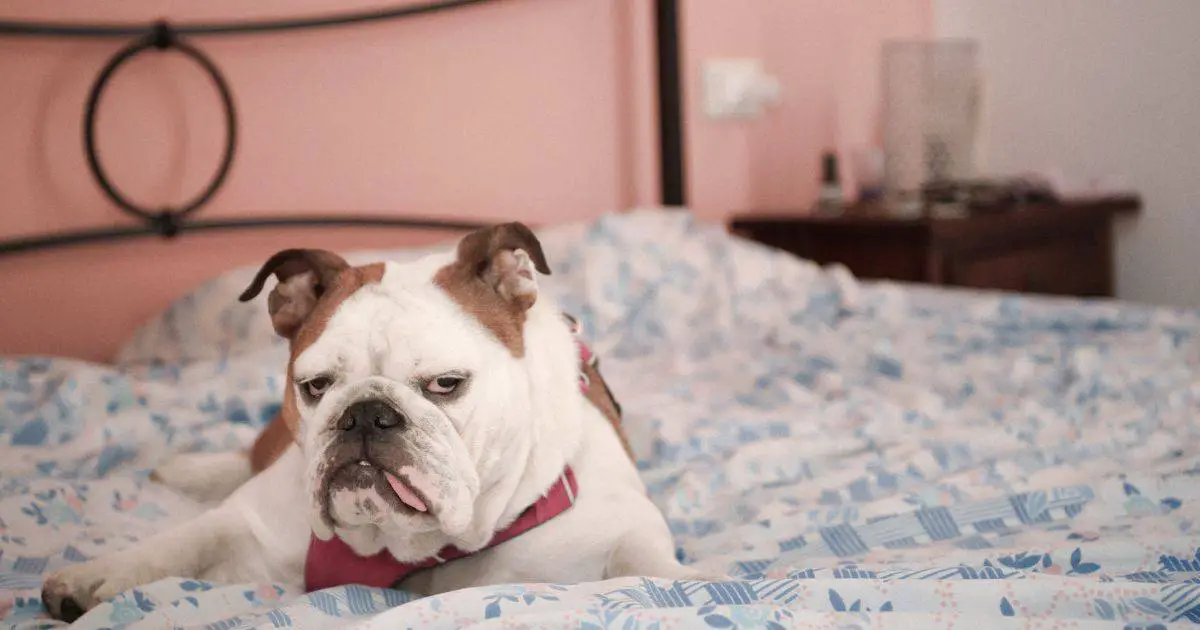
Leave a Reply
You must be logged in to post a comment.